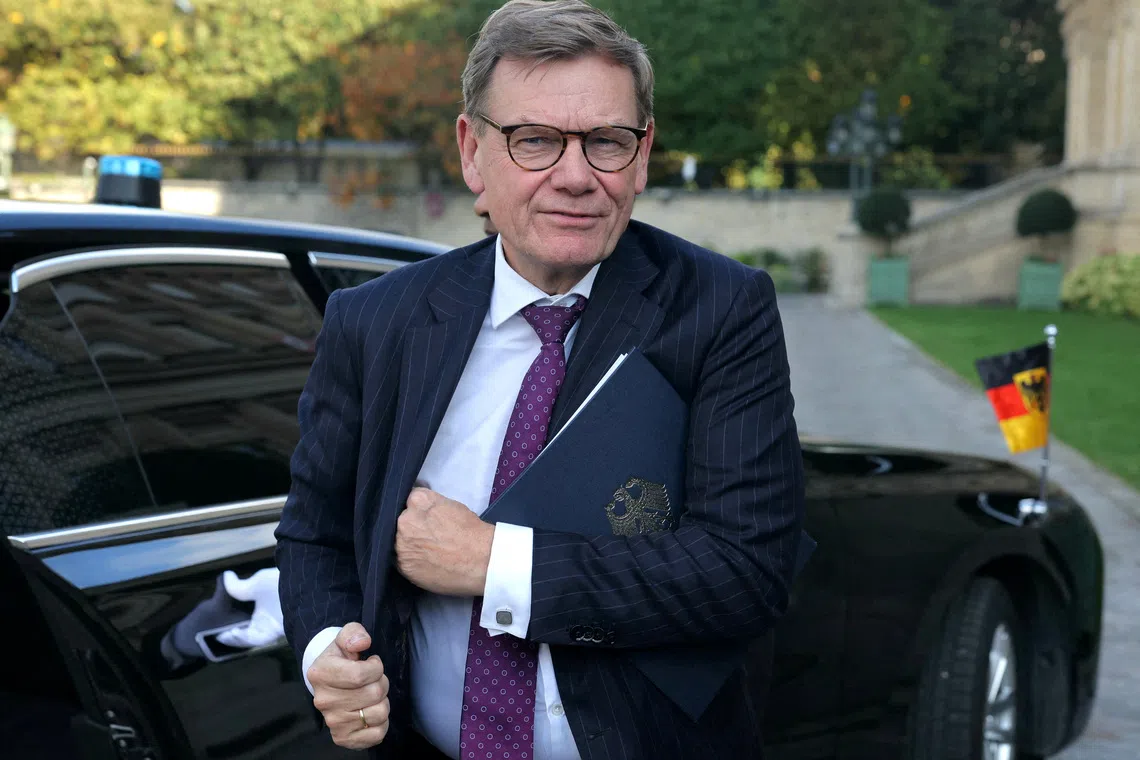Germany should rethink China strategy, lawmaker says, after German minister postponed trip
Sign up now: Get ST's newsletters delivered to your inbox

German Foreign Minister Johann Wadephul postponed his visit to China after Beijing confirmed only one of his requested meetings.
PHOTO: REUTERS
- German lawmaker Adis Ahmetovic urges a China policy rethink after a cancelled Beijing trip, highlighting tense relations and the need for strategic dialogue.
- Johann Wadephul postponed his trip due to limited confirmed meetings, signalling rising trade and security tension, particularly over rare earth exports.
- Germany aims to "de-risk" its relationship with China, balancing partnership, competition, and systemic rivalry amid global trade tension.
AI generated
BERLIN – A senior lawmaker from Germany’s Social Democrats, a junior partner in Chancellor Friedrich Merz’s coalition government, called on Oct 25 for a change of China policy after Foreign Minister Johann Wadephul postponed a trip to Beijing.
Mr Wadephul, a member of Mr Merz’s Christian Democratic Union (CDU), cancelled the trip
“The short-term cancellation of the trip to China does not bode well for an improvement in tense German-Chinese relations,” said Mr Adis Ahmetovic, foreign policy spokesperson for the Social Democrats (SPD).
“We need to rethink Germany’s China strategy. More than ever, we need an active, strategic foreign policy that focuses on dialogue, clarity and long-term interests,” he said.
Germany is Europe’s biggest economy. China is Germany’s biggest trading partner and the largest economy in Asia.
The only meeting Beijing had confirmed during Mr Wadephul’s planned trip had been with his direct counterpart, Mr Wang Yi. A German foreign ministry spokesperson, commenting on the trip’s postponement on Oct 24, also said Germany was concerned about constraints placed on rare earth exports.
Fair trade
Mr Wadephul told Reuters this week he planned to urge China to relax export restrictions on rare earths and semiconductors during his trip, which had been due to start on Oct 26, and underlined fair trade as a cornerstone of successful relations.
In a strategy on China agreed in 2023, Berlin urged the “de-risking” of the two countries’ economic relationship, calling Beijing a “partner, competitor and systemic rival”.
China provides Germany with critical components such as rare earths and chips, two areas that have been subject to severe bottlenecks as global trade tensions intensify.
The SPD’s Mr Ahmetovic said: “Direct dialogue with China is particularly important in a phase of global tension.”
Talks should be deepened “especially on issues of peace, security, the economy, trade and human rights”, he said.
Mr Juergen Hardt, foreign policy spokesman for the CDU, said China was trying to use trade policy as a means of exerting pressure and that Mr Wadephul had been right to postpone the trip.
“The German government is not playing along with this game,” he said, adding that Germany continued to value good and fair relations with Beijing. REUTERS


